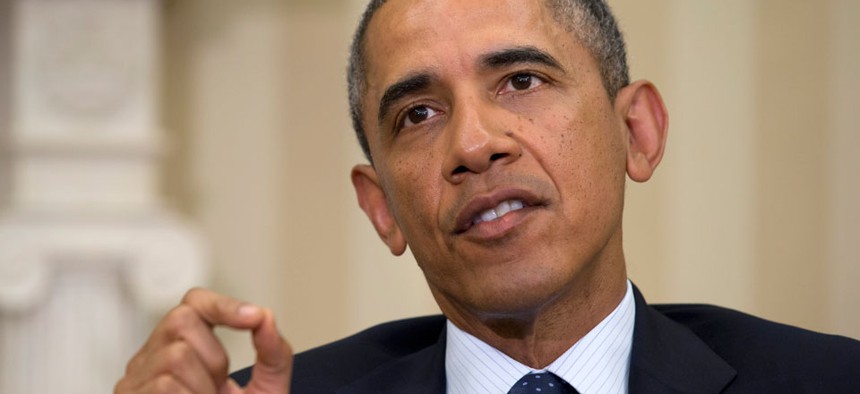If You Want Obama to Rein In the NSA, You're About to Be Disappointed
The president will embrace some surveillance reforms, but he's not about to scale back the national security state.
President Obama has a rare opportunity this week to reshape the nation's counterterrorism strategy. He won't take it.
The White House has been trying to lower expectations for the president's planned Friday speech for days now. He'll outline a series of reforms to the National Security Agency's surveillance programs in an address at the Justice Department, but Obama will do nothing to diminish the government's capacity to root out terror networks, aides say.
Ever since the flood of disclosures regarding the NSA from former contractor Edward Snowden, Obama and his team have tried to walk a careful public line: appearing to cherish Americans' privacy while defending the agency's actions, particularly the bulk collection of telephone records, the so-called "metadata."
But it's been evident all along that the White House has more or less been dragged into the reform debate. At a press conference back in August, for example, the president maintained, amid heavy criticism, that the programs are valuable and that a public skeptical about their reach simply needs reassurance that they won't be abused.
That's still Obama's view. And in the days leading to Friday's speech, Jay Carney and others in the White House have referred to the issue as one of transparency and disclosure, not of reining in government power. "The president has been clear throughout this review process that we will not harm our national security or our ability to face global threats," Obama's press secretary said last week. "And our intelligence-gathering activities are directly related to our ability to face those global threats and protect our national security."
To lay the groundwork for that position, aides to the president told the Los Angeles Times this weekend that the NSA's metadata collection scheme could have prevented the Sept. 11 attacks. What's more, Obama has adopted that "9/11 justification" for the NSA program, the paper reported.
That's a blinking-red signal that the administration is not about to be accused of making the country more vulnerable by tampering with such a preventive weapon. Remember that George W. Bush, a Republican, walked back his warrantless wiretapping program in 2007 after a public outcry. This president, a Democrat, isn't going to follow suit—especially given the new instability in Iraq and worries about the vacuum left by the coming pullout from Afghanistan.
All of which means Friday's speech is going to be a piece of kabuki theater: The president is going to have to look like he's taking meaningful action to curb the NSA's reach when he really isn't. To that end, Obama is expected to tweak the bulk data program rather than overhaul it or, as civil libertarians demand, junk it outright.
One such tweak could involve asking telecom providers to house the calling data rather than the government. Another could involve the appointment of a so-called "public advocate" to argue against the administration in the Foreign Intelligence Surveillance Court, which oversees the monitoring of suspected foreign agents.
Changes such as those, however, will be purely "cosmetic," argues Jonathan Turley, an expert on national security law at George Washington University.
That's especially true if Obama refuses to require judicial approval for all individual database searches. (Currently, for a search to be authorized, analysts at the NSA can certify a "reasonable suspicion" exists that a suspect has ties to a terror network under a blanket authorization from the FISA court.)
That means simply shifting the data from the agency to a provider like Verizon won't deny the NSA access to it at any given moment; the provider would have to comply with any request. Both current and former counterterrorism officials have come out against the judicial approval proposal, and Obama has evinced a pattern of deferring to his national security experts.
Any reforms Obama ultimately embraces likely will come from the report released last month by a hand-picked review panel, a group Turley dismisses as "intelligence hawks and Obama loyalists." One member of the panel is Michael Morell, the former acting Central Intelligence Agency director—and all five members are expected to testify before a Senate committee Tuesday.
Geoffrey Stone, a member of the review panel and a law professor at the University of Chicago, contends that even the relatively small proposal to transfer the calling-record database to private providers would show Obama is mindful of the program's potential for abuse. "The government would not be in a position to be able to misuse the data," says Stone, who was a colleague of Obama's when he taught at the school.
But Stone, too, wants the president to adopt the panel's recommendation that court approval be obtained before the metadata can be searched. The panel, he says, sees the data collection program "as a potentially useful tool, if it's subjected to really rigorous safeguards and is used only in the way that's approved"—which, Stone concedes, is a rather large caveat.
Stone's view of the program being only "potentially useful" undergirds a finding by the panel as a whole that the data-collection scheme "was not essential to preventing attacks" and that the information "could readily have been obtained in a timely manner using conventional [court] orders." On Monday, the New America Foundation released an analysis of 225 terrorism cases, concluding that the program "has had no discernible impact on preventing acts of terrorism."
And that's the real context for what Obama will say Friday. He'll have to justify the use of such data when there is little to no evidence that it has ever played a significant role in stopping a plot. He'll have to signal that he's taken the objections of nervous citizens, privacy advocates, members of Congress, and the telecom industry seriously, even as he refuses to scale back the program.
But like the White House, Stone is of the mindset that if a large-scale attack can be prevented someday by using the data-collection program, then the tradeoff in civil liberties is worth it. "If it stops that once a decade, it's a big deal," Stone says.
It's a rationale that the president himself is likely to offer in some form Friday. He's not about to be the man who walked back the War on Terror.




